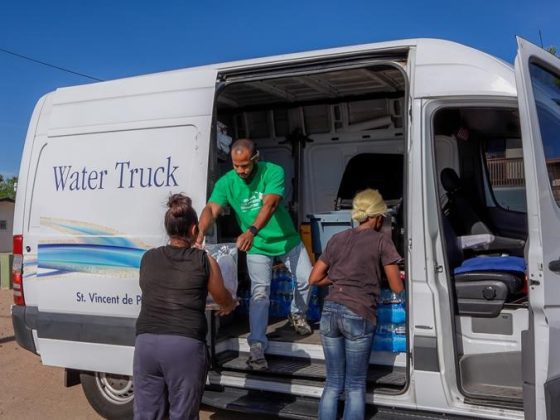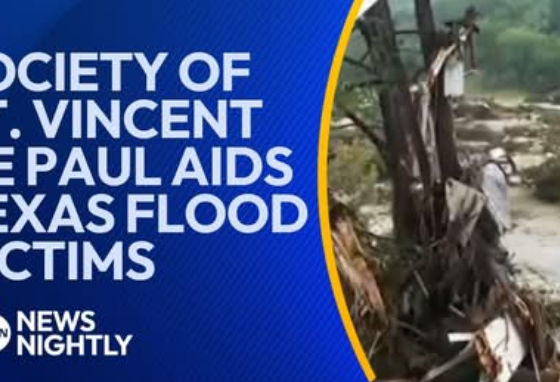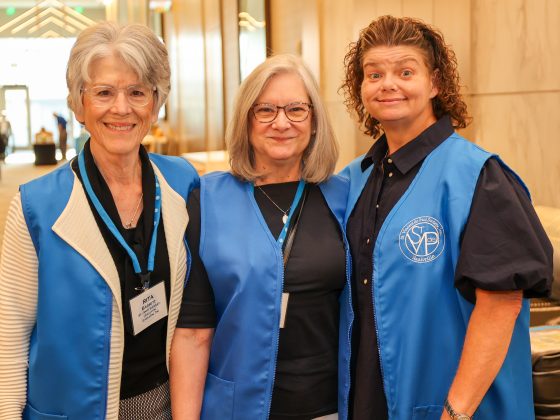Dear Vincentians,
Disaster Services Corporation (DSC) is coordinating its response to the recent devastating tornado outbreak in six states with its South Central, Midwest, North Central, Mideast, and Southeast Disaster Representatives which are part of the DSC Board’s Disaster Operations Committee. DSC is monitoring to meet the needs of survivors by working through state, local, and tribal governments and is actively coordinating with affected states to address unmet needs. We are on daily VOAD calls and conducting Coordination Calls with the Disaster Reps in the regions where the tornados hit.
DSC works through its Disaster Operations Committee and its Regional Committee Members for all disaster relief and recovery efforts. Our Regional Disaster Reps work with their local Vincentian Councils and Conferences, the local Diocese, and the state VOADs to determine the unmet needs of the impacted disaster areas. Disaster recovery takes years, and it is important to have funding for the second stages of disasters like the Parish Recovery Assistance Centers (PRACs) which help disaster survivors get registered for state and federal benefits and where Vincentians can provide spiritual and emotional care. DSC will be providing Rapid Response Grants to Councils that have unmet needs and are working to help their Diocese recover from this very tragic series of tornados.
Please continue to pray for all the families impacted by disasters during this Advent Season and if possible, please volunteer or donate to the relief efforts.
DSC Response Actions
- Damage assessment teams, additional staff, and resources are positioned and ready to deploy to Kentucky or any other affected areas.
- DSC is in contact with state VOADs and state emergency management officials as tornado damage reports come in from Arkansas, Illinois, Kentucky, Missouri, and Tennessee.
- Working with the National Council to ensure funds are available for Rapid Response Grants.
Staying Weather Aware and Safe Before, During, and After Tornadoes
Residents from east-central Mississippi to extreme southwestern Virginia should stay vigilant as this storm system moves east. Damaging wind gusts and a few tornadoes will be possible, mainly early in the day. Isolated strong wind gusts cannot be ruled out over parts of the Mid-Atlantic during the late afternoon and evening.
In any emergency, always follow the instructions given by state, local or tribal emergency management officials. Follow these tips to stay safe after a tornado.
- Stay out of the area if possible. Emergency workers may be assisting people or cleaning up debris. You can help them by staying off the roads and out of the way.
- Enter areas that have sustained damaged only after your local officials have said it is safe to do so. Always follow the direction of your local officials.
- If you suspect any damage to your home, shut off the electrical power, natural gas, and propane tanks to avoid fire, electrocution or explosions, if you know how to do so safely.
- Do not touch downed power lines or any objects that are in contact with downed lines. If you see a downed power line or other electrical hazard, report it to the police and the utility company.
- If you see frayed wiring or sparks, or if there is an odor of something burning, you should immediately shut off the electrical system at the main circuit breaker if you have not done so already.
- If you smell gas or suspect a leak, turn off the main gas valve, open all windows and leave the house immediately. Notify the gas company, the police or fire departments, or State Fire Marshal’s office. Do not turn on the lights, light matches, smoke, or do anything that could cause a spark. Do not return to your house until your local officials say it is safe to do so.
- Be careful when cleaning up. Wear protective clothing, including a long-sleeved shirt, long pants, work gloves, and sturdy thick-soled shoes. Do not try to remove heavy debris by yourself. Use an appropriate mask if cleaning mold or other debris. People with asthma and other lung conditions and/or immune suppression should not enter buildings with indoor water leaks or mold growth that can be seen or smelled. Children should not take part in disaster cleanup work.
Avoid Carbon Monoxide Poisoning:
If you lost power, avoid carbon monoxide poisoning and fires.
- Use a Generator Safely! Never use a generator inside a home, basement, shed or garage, even if doors and windows are open. Keep generators far away from windows, doors, and vents that could allow carbon monoxide to come indoors.
- Grills, camp stoves or other gasoline, propane, natural gas or charcoal burning devices should never be used inside a home, garage, basement, crawlspace, or any partially enclosed area. These should only be used outdoors and at least 20 feet away from windows.
- Never use a gas stovetop or oven to heat your home.
- For additional safety tips before, during or after a tornado visit https://www.ready.gov/tornadoes.
Contact Us
If you have any questions, please contact Disaster Services Corporation:
- DSC Media Point of Contact: Elizabeth Disco-Shearer, Chief Executive Officer at (214) 717-1802 or at ldisco@svdpdisaster.org
- Vincentian Support and Operations: Kevin Peach, Chief Operating Officer at (202) 924-6212 or at kpeach@svdpdisaster.org
Follow Us
Follow DSC on social media at: @svdpusadisaster on Twitter, @DisasterServicesCorp Facebook, , and via @disastersericescorp on LinkedIn.
DSC Mission
To model the charism of the Society of St. Vincent de Paul by providing quality programs and services to families and communities impacted by natural and manmade disasters across this great nation.
In Service,
Elizabeth Disco-Shearer
Chief Executive Officer
Disaster Service Corporation



